Next week, UN Member States and other stakeholders will convene in Geneva, Switzerland for the Eleventh Conference of States Parties (CSP11) to the Arms Trade Treaty (ATT). Scheduled for 25–29 August, CSP11 comes at a time when responsible arms regulation is essential to protect the 2 billion people living in a conflict zone.
The conference provides an opportunity to take stock of achievements and challenges to date and to develop strategies for the future. In this context, ATT States Parties will assess progress in implementing the Treaty, share challenges, and consider new measures to strengthen the ATT’s long-term impact. In practice, this means reviewing recommendations from the ATT Working Groups, adopting decisions on substantive proposals, and setting the course for the Treaty’s future direction.
Against a backdrop of intensifying armed conflicts and deepening humanitarian crises – from the devastating conflicts in Gaza, Myanmar, and Sudan to protracted violence in Yemen, Ukraine and the Democratic Republic of Congo (DRC) – this meeting is a chance for States to demonstrate renewed commitment to the ATT’s humanitarian objective: to stop irresponsible arms transfers and reduce human suffering. The decisions made at CSP11 will not only impact the Treaty implementation and credibility, but can potentially carry real consequences for individuals and communities affected by conflict and armed violence.
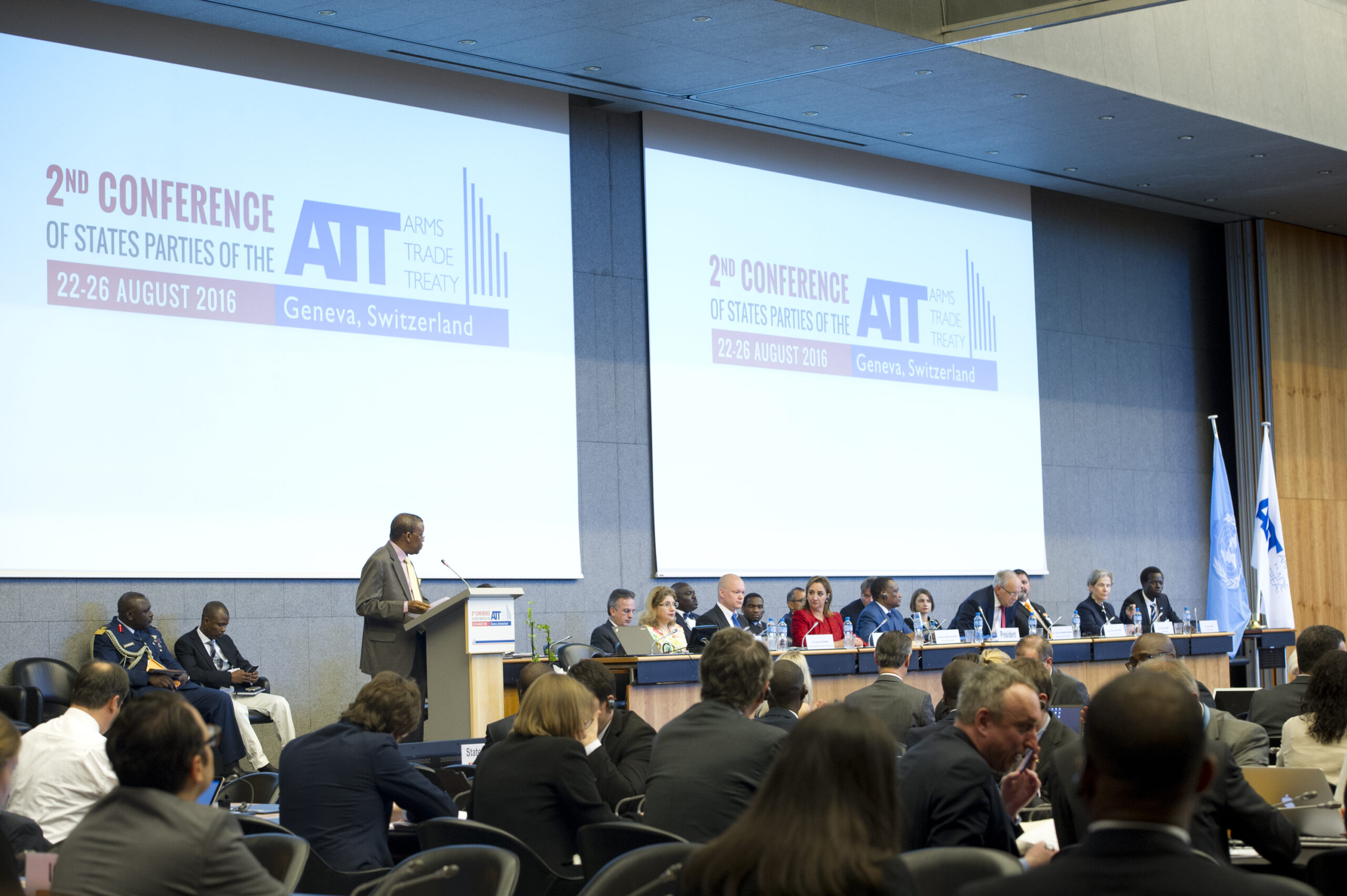
Delegates attending the second Conference of States Parties to the Arms Trade Treaty in August 2016 in Geneva, Switzerland.
CSP11: What are the key issues on the table next week?
The President of CSP11 (Ambassador Carlos Foradori of Argentina) has made “Universalization as a Priority” the thematic focus of this conference. While 116 States have now ratified the Treaty, ATT membership remains uneven, particularly in the Asia Pacific and Middle East regions. To address universalization gaps, the President’s working paper puts forward a set of recommendations including encouraging States Parties (and the ATT Secretariat) to integrate ATT universalization into bilateral and regional meetings, to share best practices with signatories and other non-state parties, and to strengthen the strategic partnership with the Inter-Parliamentary Union. It also recommends a stronger emphasis on public outreach – launching awareness campaigns that highlight the ATT’s humanitarian impact, promoting engagement with other stakeholders including industry, academia, media, and civil society; encouraging participation of youth in the ATT and identifying Goodwill Ambassadors or Champions for the ATT.
CSP11’s agenda will then focus on the work of the ATT Working Groups and the recommendations they put forward for endorsement:
- The Working Group on Treaty Universalization (WGTU) underscored the urgency of expanding ATT membership, stressing that universal participation is critical to closing persistent gaps in the global arms trade. The Co-Chairs recommended that States Parties assume the role of regional universalization champions and systematically include other regional universalization champions, regional organizations, and other regional actors in their outreach efforts. They also encourage States to share experiences by presenting on their own processes for ratification, accession, and domestication, offering practical guidance to non-States Parties.
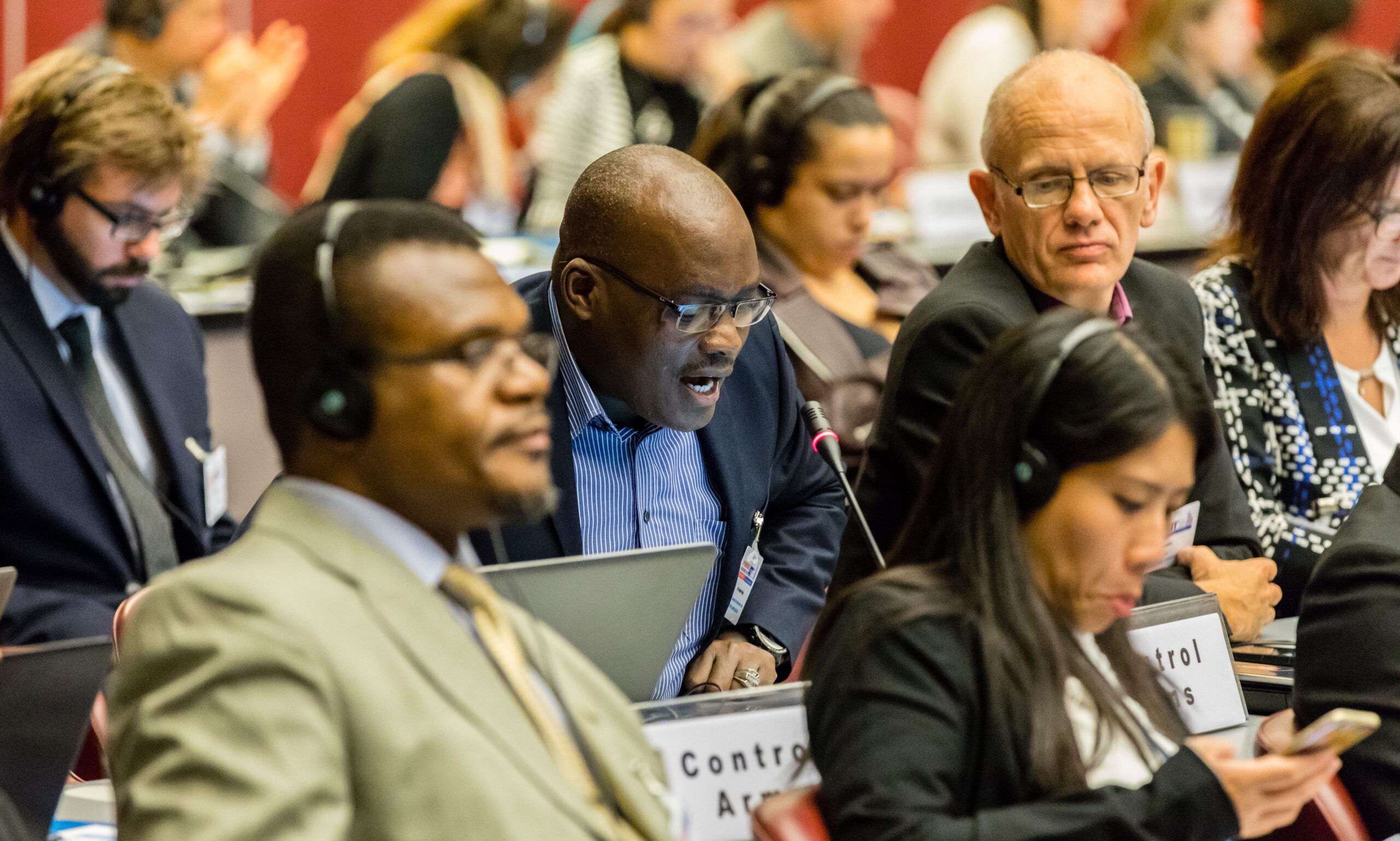
Mwachofi Singo, Deputy Director of Security Research and Information Centre (SRIC) in Kenya, delivering a statement on behalf of the Control Arms delegation under the WGETI agenda item at the Third Conference of States Parties to the ATT.
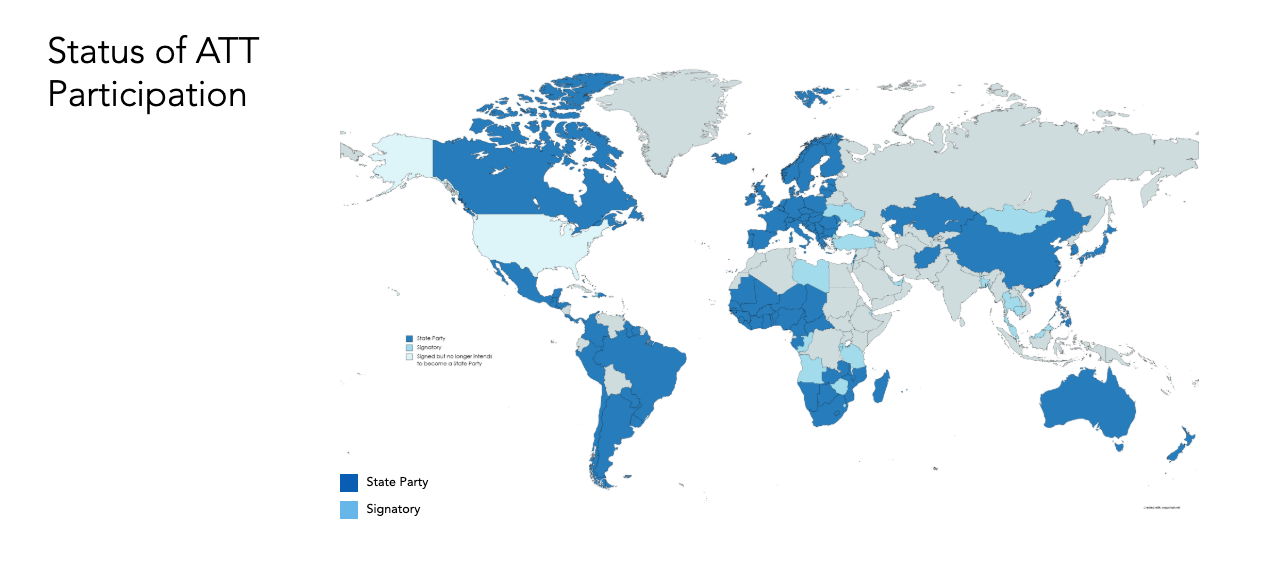
2. The Working Group on Effective Treaty Implementation (WGETI) completed the first year of its new Sub-working Group on Exchange of National Implementation Practices and its multi-year workplan, with discussions centered on practical aspects of ATT implementation. Discussions covered the role of industry in applying human rights and IHL due diligence, the risk of conventional arms being used for gender-based violence (GBV) and violence against women and children, and proposals for ad hoc discussions on current conflicts and relevant international rulings. Building on these exchanges, WGETI recommends continuing structured discussions on national practices such as import systems, control lists, and brokering, while also tackling challenges related to parts, components, and emerging technologies. WGETI further proposes continuing discussions on the development of voluntary guidance to
link industry due diligence with States Parties’ responsibilities under the ATT and to encourage the engagement of industry actors in ATT discussions. A central recommendation is the draft decision to establish Gender Focal Points (GFPs), voluntary positions that would help States mainstream gender considerations, strengthen GBV risk assessments, and promote the participation of women in ATT implementation. Another key decision which can impact the credibility of the ATT as a forum is related to the continuation of ad-hoc discussions on topics raised by States Parties and other stakeholders.
3. The Working Group on Transparency and Reporting (WGTR) emphasized the need to improve compliance with reporting obligations, noting that only around 60% of States Parties are currently submitting timely and complete reports. The WGTR recommended that States Parties submit all outstanding reports to the ATT Secretariat or seek assistance in this regard. States that have adopted new ATT implementation measures since submitting their initial reports are urged to provide updated reports, and the Secretariat is encouraged to make these updates more visible on its website. The WGTR also invited States and other stakeholders to give presentations at the next meeting on the theme of “Reports to Cabinet and/or Parliament.” In addition, States were encouraged to act as “reporting champions” and submit specific assistance offers to the Matching Database. Finally, the WGTR requested that a future session hold an in‑depth discussion on sources and methodologies for data collection, as well as decision-making on substantive reporting issues.
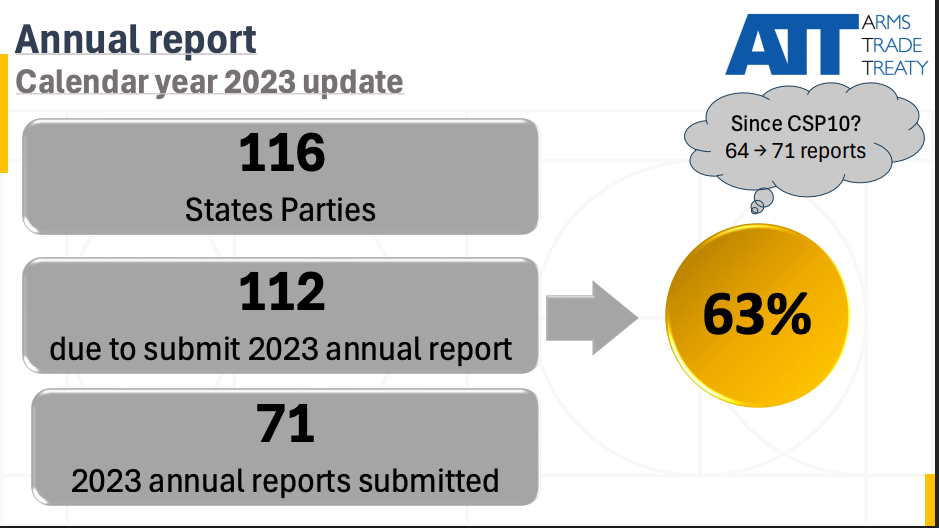
Slide from presentation on “Arms Trade Treaty Status of Reporting” provided by Tom NIJS of the ATT Secretariat during the February 2025 meeting of WGTR.

CSP11’s agenda will also include consideration of a proposal from the United Kingdom to agree on a mandate to elaborate a five-year strategy for the Arms Trade Treaty by CSP12. Currently, the ATT lacks a comprehensive multi-year strategy, resulting in ad-hoc progress and inconsistent focus from year to year. The proposal calls for the ATT Secretariat to collect inputs from States Parties and stakeholders on objectives and benchmarks, and with support from the “ATT Bureau” (comprising the President, Vice-Presidents, committee chairs, and others) to compile a draft strategy by 2026. The strategic roadmap would set clear goals and performance indicators to measure progress against priorities, to identify key opportunities and challenges facing the Treaty, assess available and needed resources, and provide guidance for prioritizing future activities.
4. CSP11 will also consider the findings of the Management Committee’s review of the revised ATT Programme of Work, tested over the past year. The revised format, which introduced one four-day Working Group session and one two-day Informal Preparatory Meeting held separately, was found to improve the quality of discussions and better prepared delegations for the Conference itself. Based on this, the Management Committee recommends continuing with the revised format. The Committee also included recommendations to improve cost-effectiveness and participation, including exploring remote interpretation, using smaller venues, strengthening the circulation of documents in advance, and aligning future thematic priorities with Working Group agendas. The next review will be conducted at CSP13.
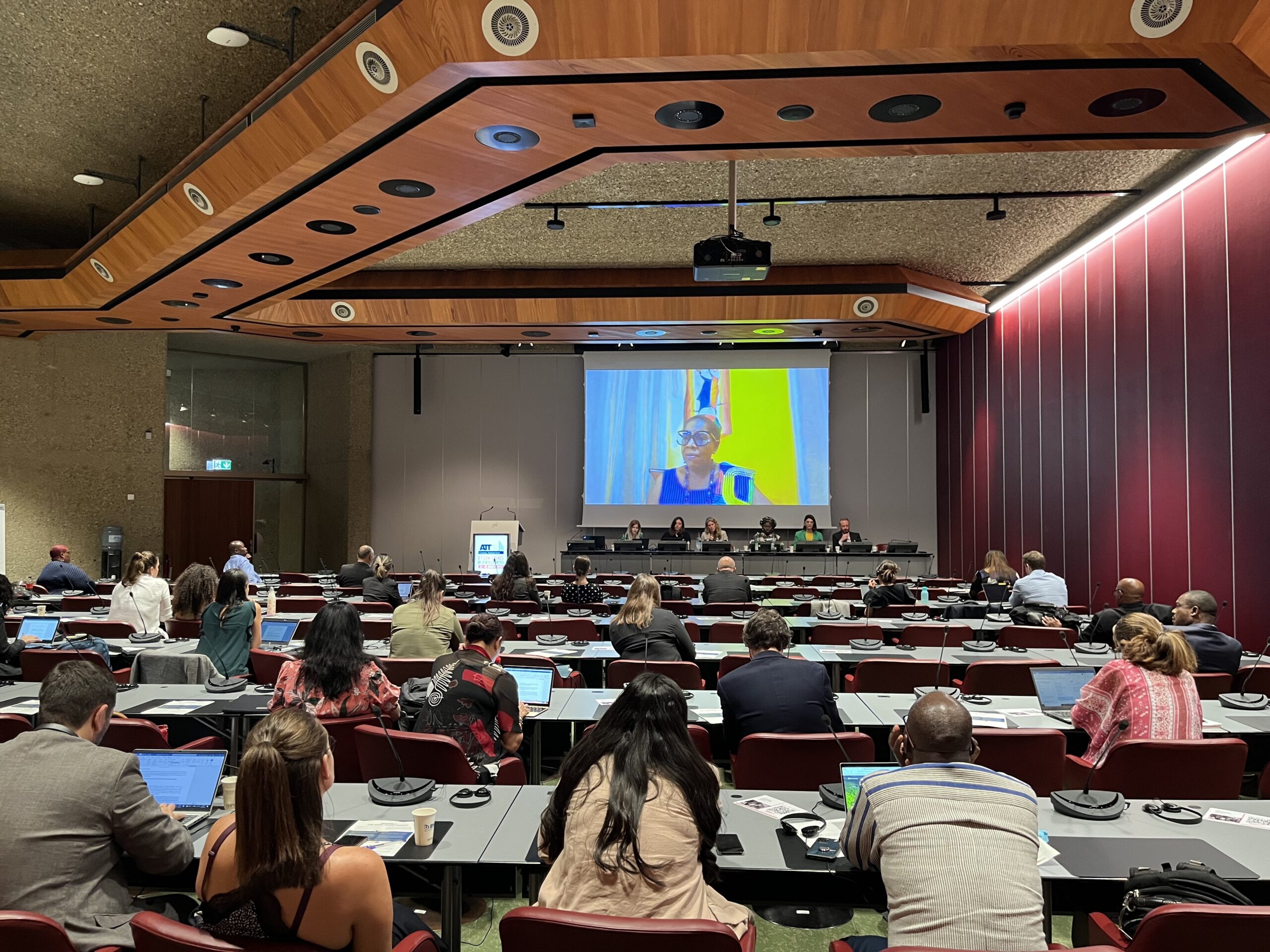
Broader Implications and Expectations
The Arms Trade Treaty was adopted to reduce human suffering caused by illicit and irresponsible arms transfers. The conflicts in Gaza, Yemen, Myanmar, Ukraine, Sudan and the Democratic Republic of Congo illustrate the devastating consequences of poorly regulated conventional arms transfers and underscore that the Treaty’s humanitarian objectives remain as urgent as ever.
The agenda before the CSP11 includes important steps to improve the Treaty’s functioning – from strengthening reporting and transparency, to advancing universalization, to agreeing on a five-year strategy. These are valuable initiatives, but they are largely procedural.

What is missing is an open and substantive discussion about how States are applying the Treaty’s provisions in their transfer decisions. Are States rigorously assessing the risks that exported arms could be used to commit violations of international humanitarian or human rights law? And if they are, on what basis are they approving arms transfers to states that are parties to ongoing conflicts? How are they evaluating diversion risks? And crucially, how are these decisions shaping the reality for civilians living under fire?
As the ATT enters its second decade, CSP11 offers a critical opportunity for States Parties to move beyond process and focus on impact. Ensuring compliance with the Treaty’s core obligations – to assess the risk of conventional arms transfer – is the only way to ensure that the ATT delivers on its promise: to reduce human suffering caused by conflict and armed violence.
